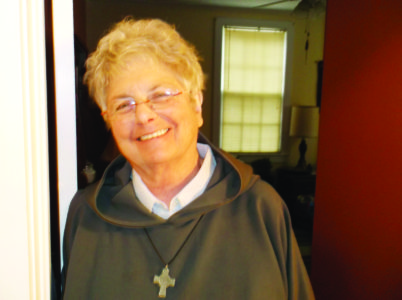
Sister alies therese
FROM THE HERMITAGE
By Sister alies terese
We often narrowly attach life-giving terms like ‘pro-life’ only to abortion or euthanasia and we forget the field is much broader than that. Let’s not forget that there are many people trapped in the death-dealing of starvation, poverty, lack of face or voice, racism, abuse and even the thirst that drives one to daily drink dirty, infected water. In all this, we still face the horrors of the death penalty.
“Well, I filed my appeal to the Supreme Court. I received a copy of it last night. I haven’t read it yet. I know what it says. We only brought up three issues. I’ll let you know when I learn new information – or something happens…” (death row inmate and friend of mine).
Actually what he didn’t say was it was his last appeal and a negative report will mean an execution date. He and I have been friends since 1996. There have been others – three executed and another three moved into general population coming off “the Row” to life without parole (whether they consider themselves innocent or not).
My heart skips a beat or two each time I get a letter from one of my friends. I am sickened even more when I hear of an execution that has been horrific and botched: wrong drugs, blocked lines, or even voltage from the electric chair was not effective.
Over many years there have been folks opposing the death penalty. There are the protestors who arrive to pray in vigil for the inmate, for the victims (if there were any) for the Church and even for the guards and ‘doctors’ who are “only doing their job” of executing. There are those who have befriended inmates, writing letters and maybe providing money to their accounts for small items. Consider St. Therese and Pranzini! There are those lawyers, often pro bono, who can defend as most condemned inmates are indigent.
In 1980, the US Catholic Bishops voted to end the death penalty. And now, in the summer of 2018, we hear this from Pope Francis:“The death penalty is never admissible and the Catholic Church will work towards its abolition around the world.”
What is even more important is that this declaration changes the Catholic Catechism. Prior to this declaration we find in the CC2267 the following:
“…the traditional teaching of the Church does not exclude recourse to the death penalty, if this is the only possible way of effectively defending human lives against the unjust aggressor. If, however, non-lethal means are sufficient to defend and protect people’s safety from the aggressor, authority will limit itself to such means, as these are more in keeping with the concrete conditions of the common good and more in conformity with the dignity of the human person. …the cases in which the execution of the offender is an absolute necessity ’are very rare’, if not practically non-existent.”
Now the Church teaches: “The death penalty is inadmissible because it is an attack on the inviolability and dignity of the person.”
In his speech to the U.S. Congress in 2015, Pope Francis reminded those gathered: “human life must be defended at every stage of development. This conviction has led me from the beginning of my ministry, to advocate at different levels for the global abolition the death penalty. I am convinced every life is sacred!”
And yet, 53 percent of U.S. Catholics support the death penalty though Pew indicates that white, evangelical Protestants’ support is the highest. Not long after the declaration, the governor of Nebraska went ahead with an execution. He frequently boasts of how he faithfully follows Church teaching: “it was what the people wanted.” Really? The discourse in the marketplace has heightened on most every topic and the death penalty is right in the middle.
And finally, let’s consider Mississippi’s legislators who voted to make available a firing squad if the drugs used in the current method of lethal injection are not available. And even more recently along with Alabama and Oklahoma, we have been given the “go ahead” to execute prisoners with nitrogen gas. This is a “new, untested, and untried method of killing women and men — or as the OK State Rep. Mike Christian refers to them as ‘these beasts,’” wrote Mike Farrell, president of the advocacy group Death Penalty focus. He continues: “Mississippi stopped using the gas chamber partly because of 1983 execution of Jimmy Lee Gray who died ‘banging his head against a steel pole…while reporters counted his moans.’”
How shall we in Mississippi vote, protest, write, pray, engage others as we apply this teaching of the Church?
One need not be ‘soft on crime’ to oppose the death penalty. Remember to pray for those on the death rows of the USA and world.
BLESSINGS.
(Sister alies therese is a vowed Catholic solitary who lives an eremitical life. Her days are formed around prayer, art and writing. She is author of six books of spiritual fiction and is a weekly columnist. She lives and writes in Mississippi.)
